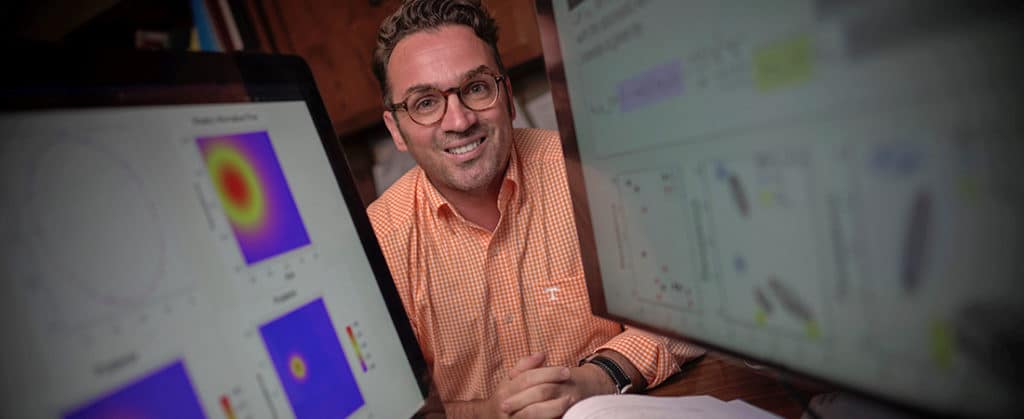Once the subject of futuristic science fiction novels, artificial intelligence (AI) is currently becoming a larger part of daily activities. From self-driving cars to choosing fantasy football lineups, people benefit every day from the mathematical algorithms and emerging technologies that allow scientists to help machines think. Vasileios Maroulas, mathematics professor at the University of Tennessee, Knoxville, is working to use similar innovations to improve national security and save lives.
Starting in September 2021, the Army Research Lab (ARL) entered into a cooperative agreement with the university for Maroulas’s project “Spatial Awareness via Topological Artificial Intelligence (SPARTAN)”.
For the past several years, Maroulas has been a senior research fellow at ARL in Aberdeen Proving Ground, Maryland, visiting the facility for a week every month to collaborate with researchers. These fellowships are designed to advance innovation at leading ARL research facilities while developing enhanced capabilities for the US Army. Specifically, Maroulas is working with researchers from ARL’s Human Research and Engineering Department, whose mission is to leverage emerging machine learning technology to increase soldiers’ effectiveness and efficiency.
Deb Crawford, vice chancellor for research, innovation, and economic development explained the significance of Maroulas’s work with the ARL.
“Dr. Maroulas brings state-of-the-art knowledge and creative ideas to his ARL colleagues, and gets immediate feedback on their translational impact,” Crawford said. His work is a great example of how UT Research is making life and lives better, and his ARL appointment is testimony to his reputation as a leading scholar in the rapidly growing and highly impactful field of AI”.
Maroulas’s work with the Department of Defense (DOD) began at a neurobiology seminar hosted by the National Institute for Mathematical and Biological Synthesis (NIMBioS) in 2015. Maroulas is the Director of Data Science and AI at NIMBioS. The workshop brought together researchers from multiple disciplines to explore ways to use mathematical modeling to better understand human sensory, motor, and analytical systems.
His current research examines the physiological data of human spatiotemporal processing. Brain activity is gathered through electroencephalograms (EEG), which record the electrical activity of the brain. By analyzing the resulting data, Maroulas is working to discover patterns in brain activity during spatial recognition over time.
“Let’s imagine a quarterback who is processing the information he needs to make a decision about where to throw the ball,” Maroulas explained. “If you really look at the brain when there is high focus, you can see the activity increase in the information processing centers of the brain. I am trying to understand these patterns to develop ways to embed them into an algorithm that can be programmed into a machine”
Maroulas is focused on helping machines to increase their efficiency in analyzing locations.
“Humans understand space very well, based on a lifetime of experiences that allow us to create context,” noted Maroulas. “Machines don’t have those experiences and have to start from scratch, scanning an area to gather information. That information can then be used to compare the machine’s previous experiences with other structures and other spaces.”
This research could dramatically advance the AI field. AI typically relies on neural network models that mimic features of the human visual system neural network, which allow it to make accurate and detailed observations. Maroulas’s research has the potential to make the next logical leap by programming abstract thinking and spatial analysis into a machine learner, allowing it to make those observations faster and more effectively.
This type of programming allows for the optimization of the machine-human partnership. Human decision making can be compromised by stress, fatigue, and other factors. Machines can counteract that by providing rapid data processing and outcome prediction, which allow humans to leverage faster decision-making and optimize efficiency.
Ultimately, the goal of this research is to reduce casualties and save lives.
“If we continue our previous analogy, you can substitute the quarterback with the general and you can substitute the rest of the players with soldiers,” Maroulas emphasized. “The resulting scenario is a clear paradigm for how DOD can use AI to enhance military decision-making in high-stress environments.”
Looking forward, Maroulas has a lofty vision for the future of AI research at UT.
“Over the next few years, I envision the creation of a research ecosystem to develop AI research that is relevant to all services of the Department of Defense, and also establishes a workforce pipeline,” Maroulas opined. “By equipping our students with state-of-the-art AI knowledge, we are creating a workforce knowledgeable about DoD-relevant research, and who are prepared to be extremely successful in DOD positions. I could even see an AI center of excellence here at UT.”
Crawford noted that UT is committed to expanding its DoD portfolio.
“In 2021, we are repositioning our UT Space Institute to better serve the needs of our aerospace and defense partners and sponsors. Our goals are to not only advance research in areas important to national security but also support focused faculty hires, expand our defense-related undergraduate and graduate programs in critical need areas, and attract additional industry partners to Tennessee.”
Maroulas views machine learning research as a catalyst for human growth.
“Humans are adaptable. Throughout our history, we see how that adaptability has allowed us to progress. Improved technology creates an environment that allows humans to continue to explore,” Maroulas said. “I think that AI can do the same thing—allowing us to progress and innovate. I believe AI can help push us to the next level.”
